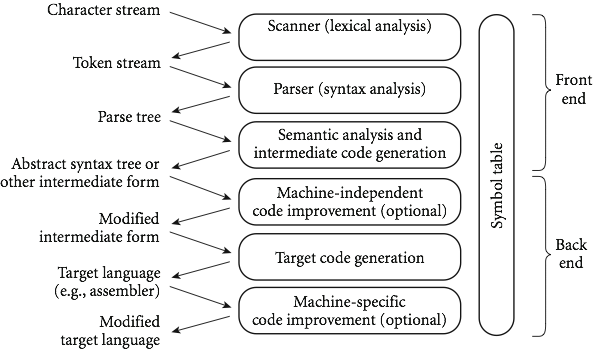Multi-Paradigm Programming and Scripting
| Why Multi-Paradigm Programming and Scripting? | |||
|---|---|---|---|
| |||
| Content of this course | |||
Programming Constructs:
|
Programming Paradigms & Languages:
|
Scripting:
|
Applications of Shell Scripting:
|
Contents
Languages evaluation Criteria
https://www.cs.scranton.edu/~mccloske/courses/cmps344/sebesta_chap1.html
| Readability | Writability | Reliability | Cost | Other criteria |
|---|---|---|---|---|
|
This refers to the ease with which programs (in the language under consideration) can be understood. This is especially important for software maintenance.
|
This is a measure of how easily a language can be used to develop programs for a chosen problem domain.
|
This is the property of performing to specifications under all conditions.
|
The following contribute to the cost of using a particular language:
|
|
Imperative versus declarative code
Imperative paradigm
Procedural and object-oriented programming belong under imperative paradigm that you know from languages like C, C++, C#, PHP, Java and of course Assembly.
Your code focuses on creating statements that change program states by creating algorithms that tell the computer how to do things. It closely relates to how hardware works. Typically your code will make use of conditinal statements, loops and class inheritence.
Example of imperative code in JavaScript is:
class Number {
constructor (number = 0) {
this.number = number;
}
add (x) {
this.number = this.number + x;
}
}
const myNumber = new Number (5);
myNumber.add (3);
console.log (myNumber.number); // 8
Declarative paradigm
Logic, functional and domain-specific languages belong under declarative paradigms and they are not always Turing-complete (they are not always universal programming languages). Examples would be HTML, XML, CSS, SQL, Prolog, Haskell, F#and Lisp.
Declarative code focuses on building logic of software without actually describing its flow. You are saying what without adding how. For example with HTML you use
Example of declarative code in JavaScript is:
const sum = a => b => a + b;
console.log (sum (5) (3)); // 8
Compilation vs Interpretation
Object-Oriented Paradigm
C++ Inheritance
https://www.w3schools.com/cpp/cpp_inheritance.asp
https://www.tutorialspoint.com/cplusplus/cpp_interfaces.htm
Difference Between Static and Dynamic Binding
https://techdifferences.com/difference-between-static-and-dynamic-binding.html
Reflection
A programming language that supports reflection allows its programs to have runtime access to their types and structure and to be able to dynamically modify their behavior
- The types and structure of a program are called
metadata
- The process of a program examining its metadata is called
introspection
- Interceding in the execution of a program is called
intercession
Uses of reflection for software tools:
- Class browsers need to enumerate the classes of a program
- Visual IDEs use type information to assist the developer in building type correct code
- Debuggers need to examine private fields and methods of classes
- Test systems need to know all of the methods of a class
Downsides of Reflection:
- Performance costs
- Exposes private fields and methods
- Voids the advantages of early type checking
- Some reflection code may not run under a security manager, making code nonportable
Reflection in Java
- Limited support from
java.lang.Class
- Java runtime instantiates an instance of
Classfor each object in the program
- The
getClassmethod ofClassreturns theClassobject of an object
float[] totals = new float[100];Class fltlist = totals.getClass();Class stg = "hello".getClass();
- If there is no object, use class field:
Class stg = String.class;
- Class has four useful methods:
getMethodsearches for a specific public method of a classgetMethodsreturns an array of all public methods of a classgetDeclaredMethodsearches for a specific method of a classgetDeclaredMethodsreturns an array of all methods of a class- The
Methodclass defines the invoke method, which is used to execute the method found bygetMethod
Some tutorials
Examples from Introduction to Programming Using Python 3
http://www.cs.armstrong.edu/liang/py/ExampleByChapters.html
C++ tutorial
http://www.cplusplus.com/doc/tutorial/program_structure/
